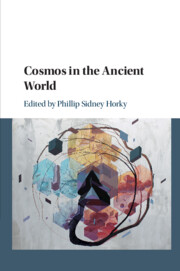Book contents
- Cosmos in the Ancient World
- Cosmos in the Ancient World
- Copyright page
- Dedication
- Epigraph
- Contents
- Contributors
- Acknowledgements
- An Historical Note on Kόσμος – Terminology
- Abbreviations
- Introduction
- Chapter 1 When Did Kosmos Become the Kosmos?
- Chapter 2 Ordering the Universe in Speech
- Chapter 3 Diakosmêsis
- Chapter 4 Aristotle on Kosmos and Kosmoi
- Chapter 5 Order and Orderliness
- Chapter 6 Polis as Kosmos in Plato’s Laws
- Chapter 7 Relating to the World, Encountering the Other
- Chapter 8 Tradition and Innovation in the Kosmos–Polis Analogy
- Chapter 9 Cosmic Choruses
- Chapter 10 All the World’s a Stage
- Chapter 11 The Architectural Representation of the Kosmos from Varro to Hadrian
- Chapter 12 “The Deep-Sticking Boundary Stone”
- Chapter 13 Cosmic Spiritualism among the Pythagoreans, Stoics, Jews and Early Christians
- Afterword
- Bibliography
- Index Locorum
- General Index
Chapter 4 - Aristotle on Kosmos and Kosmoi
Published online by Cambridge University Press: 18 June 2019
- Cosmos in the Ancient World
- Cosmos in the Ancient World
- Copyright page
- Dedication
- Epigraph
- Contents
- Contributors
- Acknowledgements
- An Historical Note on Kόσμος – Terminology
- Abbreviations
- Introduction
- Chapter 1 When Did Kosmos Become the Kosmos?
- Chapter 2 Ordering the Universe in Speech
- Chapter 3 Diakosmêsis
- Chapter 4 Aristotle on Kosmos and Kosmoi
- Chapter 5 Order and Orderliness
- Chapter 6 Polis as Kosmos in Plato’s Laws
- Chapter 7 Relating to the World, Encountering the Other
- Chapter 8 Tradition and Innovation in the Kosmos–Polis Analogy
- Chapter 9 Cosmic Choruses
- Chapter 10 All the World’s a Stage
- Chapter 11 The Architectural Representation of the Kosmos from Varro to Hadrian
- Chapter 12 “The Deep-Sticking Boundary Stone”
- Chapter 13 Cosmic Spiritualism among the Pythagoreans, Stoics, Jews and Early Christians
- Afterword
- Bibliography
- Index Locorum
- General Index
Summary
The concept of kosmos did not play the leading role in Aristotle’s physics that it did in Pythagorean, Atomistic, Platonic, or Stoic physics. Although Aristotle greatly influenced the history of cosmology, he does not himself recognize a science of cosmology, a science taking the kosmos itself as the object of study with its own phenomena to be explained and its own principles that explain them. The term kosmos played an important role in two aspects of his predecessor’s accounts that Aristotle rejected: first, cosmogony and kosmopoiia, generation or creation of the kosmos; second, diakosmêsis, arranging of a plurality of kosmoi. Aristotle was extremely critical of accounts involving kosmopoiia and diakosmêsis and developed general dialectical strategies against them. In emphatically distinguishing his view from all his predecessors' (including Plato), he uses the terms ho ouranos (the heaven), to holon (the whole) and to pan (the totality) in preference to ho kosmos (the kosmos or world). There is usually no harm in speaking loosely of ‘Aristotle’s cosmology’ when referring to his concept of the order of nature and the ouranos. Nevertheless, Aristotle’s theoretical philosophy offers something very different from those of his predecessors, for whom kosmos was a keyword.
- Type
- Chapter
- Information
- Cosmos in the Ancient World , pp. 74 - 107Publisher: Cambridge University PressPrint publication year: 2019
- 2
- Cited by

